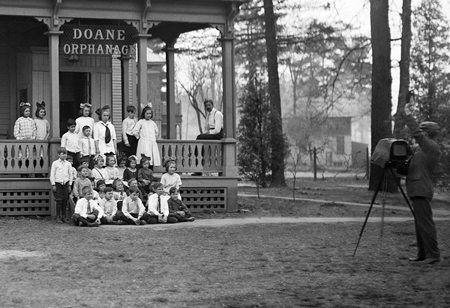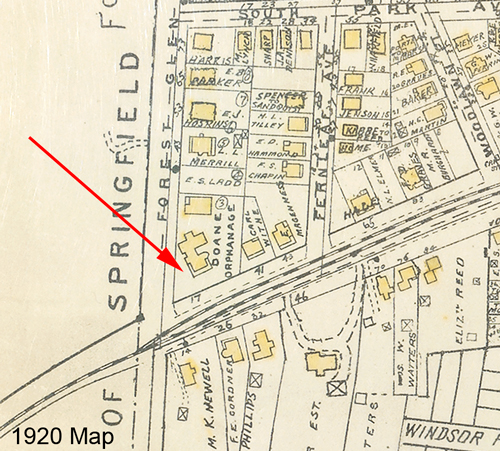|
The Doane Orphanage
by Linda Abrams- Curator, Longmeadow Historical Society-
May 2009
In 1902,
George Sanford Doane and his wife Lucy Maria Cook. after
suffering the loss of all their children to various
childhood illnesses, established an Orphanage at the
corner of Longmeadow Street and Forest Glen Road. At
that time George and Lucy were in their 50's and desired
to create a loving educational institution for the many
homeless orphans in Springfield.
They purchased two acres and had two
buildings erected; one facing Longmeadow Street that was
the girls’ dormitory and the other facing Forest Glen
Road that was the boys’ dormitory.
In the rear was
an old large barn with all three buildings around a
central playground. At first the children were educated
at the orphanage, later the children attended Center
School, and lastly Converse Street School before the
Orphanage was closed in 1930.

Paesiello Emerson (?) taking photo
128_572 (April 14, 1915)
George
Sanford Doane was a direct descendant of John Doane who
immigrated to Plymouth in 1635 and who later settled in
Eastham and married Hannah Bangs. There is a very large
glacial rock in Eastham, known as Doane's Rock located
on the original Doane property, now part of the National
Seashore, should you happen to visit the area.
The buildings of the Doane Orphanage
are long gone replaced by 20th century homes but the
address then was 17 Longmeadow Street. The first
Superintendent of the Orphanage was Mrs. Cornelia E
Blake. Mr. and
Mrs. Doane, after establishing the Orphanage, built a
home at 133 Longmeadow Street.
Satisfied that
the Orphanage was being well-run and well-funded, the
Doanes moved to Pasadena, California, at the time
thought of as a healthy place to retire to, but both
died soon after their
arrival.

In the 1910 US Census, 25 children, ages
5 to 11, were residents of the Orphanage with
birthplaces ranging including Massachusetts, Vermont,
Ohio, Maine and Connecticut. Below are the list of
names and ages from the 1910 US Census
| Name |
Age |
Birthplace |
|
Name |
Age |
Birthplace |
| Bennett, Charles H. |
10 |
MA |
|
Lillian R. Janiecke |
10 |
CT |
| Blodgett, Harry L. |
7 |
MA |
|
Minnie E. Janiecke |
6 |
CT |
| Carter, Charles |
7 |
MA |
|
Miller, Alice |
7 |
MA |
| Carter, Marion E. |
10 |
MA |
|
Miller, Jennie |
6 |
MA |
| Christianson, Carl O. |
9 |
MA |
|
Mitchell, Edith M. |
11 |
MA |
| Christianson, Elsie A. |
6 |
MA |
|
Oldach, Marjory |
7 |
Ohio |
| Clark, Dorcas P. |
9 |
MA |
|
Pierce, Frederick C. |
7 |
ME |
| Clark, Josephine C. |
7 |
MA |
|
Pierce, Ruth M. |
8 |
ME |
| Colon, J. Duane |
10 |
MA |
|
Raverta, Assunta |
5 |
CT |
| Gooly, Dorothy M. |
8 |
MA |
|
Raverta, Rita |
9 |
CT |
| Holmes, Albert H. |
11 |
MA |
|
Raverta, Rosie |
7 |
CT |
| Holmes, Nigel C. |
8 |
MA |
|
Rompel, Emily |
10 |
MA |
| Jamieson, Hazel M. |
10 |
VT |
|
|
|
|
The 1920 Census showed 28
children ranging in age from 5 to 12.
In many cases brothers and sisters were paired
together.
| Name |
Age |
Birthplace |
|
Name |
Age |
Birthplace |
| Anderson, William |
11 |
VT |
|
Matti, Gladys B. |
10 |
MA |
| Beriault, Erline |
9 |
MA |
|
Miller, John T. |
10 |
MA |
| Butler, Ernest S. |
9 |
MA |
|
Miller, Richard, A. |
9 |
MA |
| Butler, Pearl |
9 |
MA |
|
Morse, Samuel |
7 |
MA |
| Collins, Frederick |
10 |
MA |
|
Roberts, Ethel |
10 |
Montana |
| Collins, Henry |
12 |
MA |
|
Roberts, Annie |
5 |
MA |
| Dow, Franklin M. |
8 |
MA |
|
Rodasti, Frances |
8 |
CT |
| Dow, Perley R. |
10 |
MA |
|
Rodasti, Rosie |
6 |
CT |
| Duncan, Albert |
7 |
VT |
|
Shoemaker, Gordon H. |
9 |
MA |
| Duncan, Willie H., Jr. |
10 |
VT |
|
White, Margaret |
10 |
MA |
| Gagnon, Lillian |
8 |
MA |
|
White, Miriam |
6 |
MA |
| Henry, Susie M. |
9 |
RI |
|
Whitman, Beatrice S. |
5 |
MA |
| Knight, Althea |
7 |
MA |
|
Whyte, Alexander |
10 |
MA |
| Matti, Esther |
8 |
MA |
|
Yule, Jessie |
12 |
MA |
The children are listed, not only in
the hope that memories of their time in Longmeadow were
happy times, but to also hope they found good homes, and
to reflect for a moment how uncertain they must have
felt abut their circumstances.
Miss
Georgia Robinson succeeded Mrs Blake as Superintendent
and changed the plan of operation from that of an old
fashioned institution to one which gave individual
treatment to the children. Oddly, when prohibition went
into effect, the number of children brought to the
Orphanage declined. This led to the eventual closure
with remaining funds used toward tuition of the last
children at private boarding schools.
|

